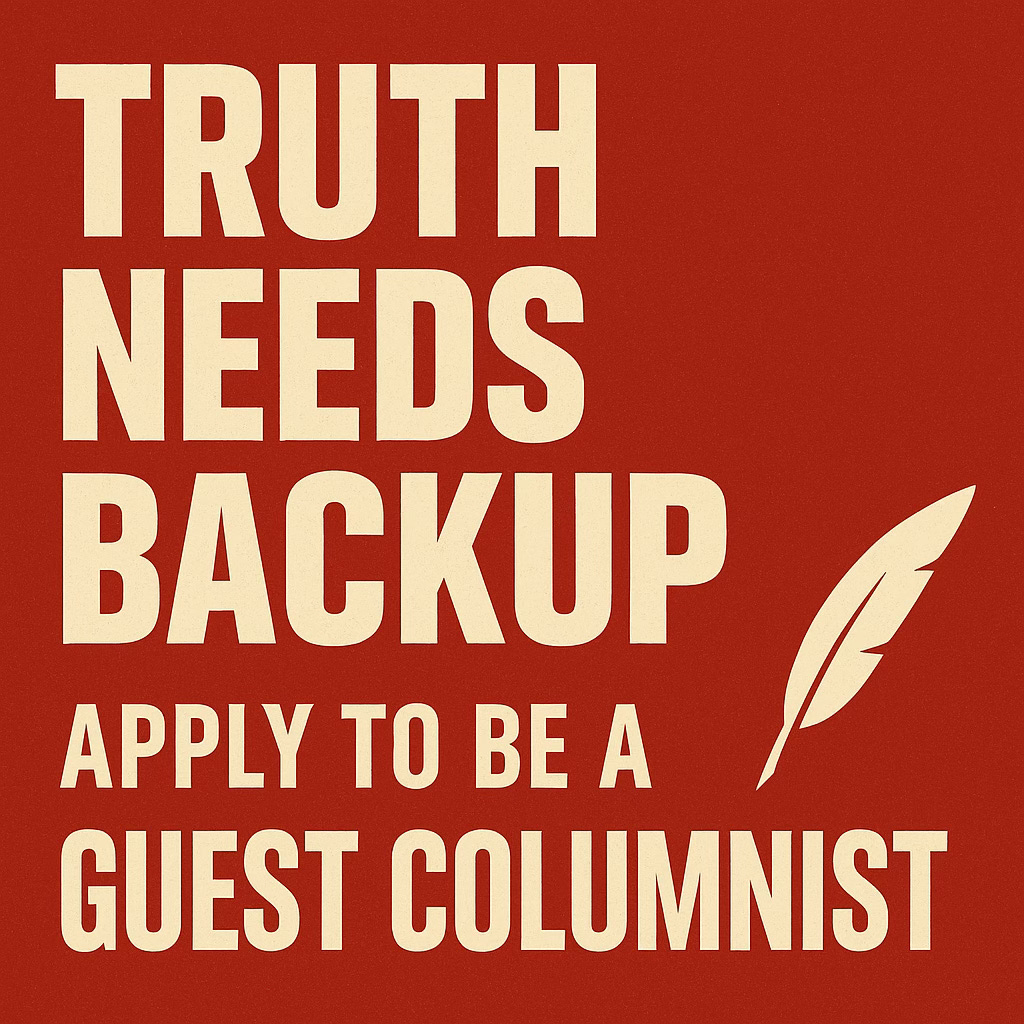Motherhood in America: Why does our government hate us?
America Loves Mothers the Way It Loves Guns: Just for Show.
Opinion by: A US Mother, In partnership with Friendo Media & everyone holding this system accountable.
I was laid off 24 hours after I gave birth. No empathy for my condition, nor my ability to support my family, just a severed tie with my life blood. The same life blood that not only paid my bills, but gave me health insurance during a time when I had just grown and delivered a human with my own body.
When I told people, their first response was, “How is that legal?” It is. In this country at least.
Motherhood is often hailed as the most revered role in American life. Politicians invoke it with reverence; brands celebrate it with sappy commercials; and our culture extols it as the pinnacle of womanhood. But beneath the flowers on Mother’s Day and the moral posturing in speeches lies a jarring truth: in practice, the United States routinely fails mothers. Worse yet, it actively undermines them through a patchwork of contradictory policies that reveal where the nation’s values truly lie.
Let’s examine just a few of these contradictions:
1. “Pro-life” policies that abandon life after birth. In states that have led the charge to ban abortion, maternal mortality rates are among the highest in the developed world. These same states often have some of the lowest rates of access to prenatal care, affordable child care, and Medicaid expansion. There is currently the “Big, Ugly Piece of Shit” Bill being voted on in the Senate that will rip healthcare and access to food away from CHILDREN. You cannot claim to protect life while cutting the social safety nets that ensure that life thrives.
It feels contradictory to me to say you’re pro-life, but then actively contribute to children starving to death, but that’s just me.
2. A country that reveres family but refuses paid leave. The United States is one of the only industrialized nations that doesn’t guarantee paid parental leave. New mothers are forced to return to work mere weeks after giving birth, often still bleeding, healing, and sleep-deprived. If motherhood is so sacred, why is bonding with and caring for a newborn treated like a luxury rather than a right?
3. “Work ethic” worship that punishes caregiving. The American mythos praises hard work and bootstrapping, but caregiving—one of the most demanding forms of labor—is unpaid, unprotected, and devalued. Mothers are expected to somehow be both full-time workers and full-time caregivers. If they step back from work, they are penalized economically and professionally. If they don’t, they’re shamed for “not being there enough.”
4. Encouragement to have children, but no child care. Politicians decry “population decline” and encourage higher birth rates, yet child care remains unaffordable or entirely inaccessible for millions of families. In some states, child care costs more than college tuition. Without public investment in affordable care options, choosing to have children becomes an act of financial peril.
Remember that time that Senator Ron Johnson said it wasn’t society’s responsibility to “care for other peoples’ children?” And then continued to support bills that cut unemployment to “force people back to work,” even though unemployment is temporary and requires actively searching for work in order to receive it. I personally had to search for jobs actively, even when I was days post partum because looking for jobs during such an unsteady time is so difficult.
5. Moralizing about motherhood, while criminalizing mothers. Low-income and Black mothers are scrutinized, surveilled, and criminalized at disproportionately high rates. From welfare restrictions to punitive responses from child protective services, motherhood in America is not treated equally. The system penalizes women for the very poverty and systemic inequities it perpetuates.
This is only being exacerbated by the anti-abortion laws wreaking havoc in our nation. Women having miscarriages, a VERY common experience by people who get pregnant, are being criminalized for not carrying their baby to term. So, to avert facing this issue, many women are choosing not to have children at all.
6. Mental health crises without mental health care. We raise awareness about postpartum depression, yet mental health services remain out of reach for many mothers. Therapy isn’t covered, childcare isn’t provided for appointments, and stigma silences those who need help the most. The message: “Be strong, but don’t expect support.”
These contradictions aren’t accidental—they are the result of policy choices. They reflect a country that loves the idea of motherhood more than actual mothers. They reflect a government that enforces control over reproductive decisions without assuming responsibility for the lives that result. They reflect a capitalist structure that views care work as invisible and expendable, and a political class that offers sentiment in place of structural change.
It doesn’t have to be this way.
Imagine a country where paid family leave is standard, child care is publicly funded, and health care is universal. Where maternal health outcomes aren't shaped by your ZIP code or the color of your skin. Where caregiving is recognized as valuable work and supported accordingly.
America doesn’t have a motherhood problem—it has a policy problem. And until that changes, the contradictions will persist, and the women who hold society together will continue doing so without the support they deserve.
Let’s stop pretending we revere mothers, and start building a society that proves it.
But how do we fix it?
1. Build Mutual Aid and Community Infrastructure
When institutions fail, communities fill the gap.
Start or support mutual aid networks: These networks redistribute resources like diapers, rent support, food, and transportation for parents in crisis—without bureaucracy or surveillance.
Create local child care co-ops: Parents can rotate care, share costs, or pool resources to hire trusted providers. Think: small, neighborhood-based solutions.
Offer respite and postpartum care in your community: Just being someone who checks in, brings food, or holds the baby for 30 minutes is radical solidarity.
2. Organize Locally—That’s Where the Power Is
Change doesn’t start in Washington. It starts in your city council, school board, and state house.
Push for local policy wins: Paid family leave, universal pre-K, child care subsidies, and CPS accountability often start at the municipal or state level.
Show up to budget hearings: How your city or county spends money—on police vs. public health, for instance—has a direct impact on mothers.
Run for office, or support candidates who reflect your values: Local elections are low-turnout but high-impact.
3. Disrupt the Narrative
Systems don’t just run on money and laws—they run on stories.
Refuse to let the state define “good motherhood”: Speak up when poor, disabled, immigrant, queer, or Black mothers are pathologized or criminalized.
Tell your story, or amplify others’: Whether through op-eds, social media, or storytelling events, public narratives shift policy when they show real people behind the data.
Challenge cultural shame: Normalize asking for help. Normalize community care. Normalize not being perfect.
4. Fund and Join Radical Organizations
If policy won't budge from above, we can build pressure from below.
Support orgs doing legal defense, advocacy, and direct aid for mothers, like:
National Bail Out’s Black Mama’s Bailout
SisterSong
National Birth Equity Collaborative
MomsRising
Volunteer your time, skills, or resources. Whether it’s graphic design, grant writing, fundraising, or babysitting during a protest—every contribution matters.
5. Practice Economic Solidarity
The system is designed to isolate mothers—especially those struggling financially. Push back.
Pay caregivers equitably when you can. That means domestic workers, babysitters, and family.
Advocate for fair parental policies in your own workplace. Even small shifts (like paid sick time or flexible schedules) make a difference.
Buy from mother-owned businesses, especially those run by BIPOC and immigrant women. Women are historically less likely to receive business loans than men - they rely on grassroots support.
6. Educate, Radicalize, and Connect
The more people understand how motherhood is politicized, the more they’ll demand change.
Host reading or discussion groups around books like Reproductive Justice (Ross et al.), Invisible Women, or Revolutionary Mothering.
Link up with broader movements. Reproductive justice, economic justice, racial justice—they’re all intertwined.
Radicalize the PTA. Yes, really. Schools are where policy, parenting, and politics collide.
7. Protect Each Other in the Meantime
If the government criminalizes mothers, we need to be each other’s shield.
Know your rights around CPS interactions. Help others understand what to say, what to ask, and how to get legal help.
Form neighborhood safety networks. If someone’s in danger of losing their kids because of poverty, how can your community step in?
Push for harm reduction policies at the community level, like safe housing for pregnant people with substance use histories.
Systems don’t collapse because the powerful decide they’re broken. They collapse because people decide to stop upholding them. Every meal you share, every child you care for, every lie you unlearn about “good” motherhood—that’s revolution.
You don’t need permission to build a world that loves mothers better. You just need to show your own love for mothers in every way you can.




